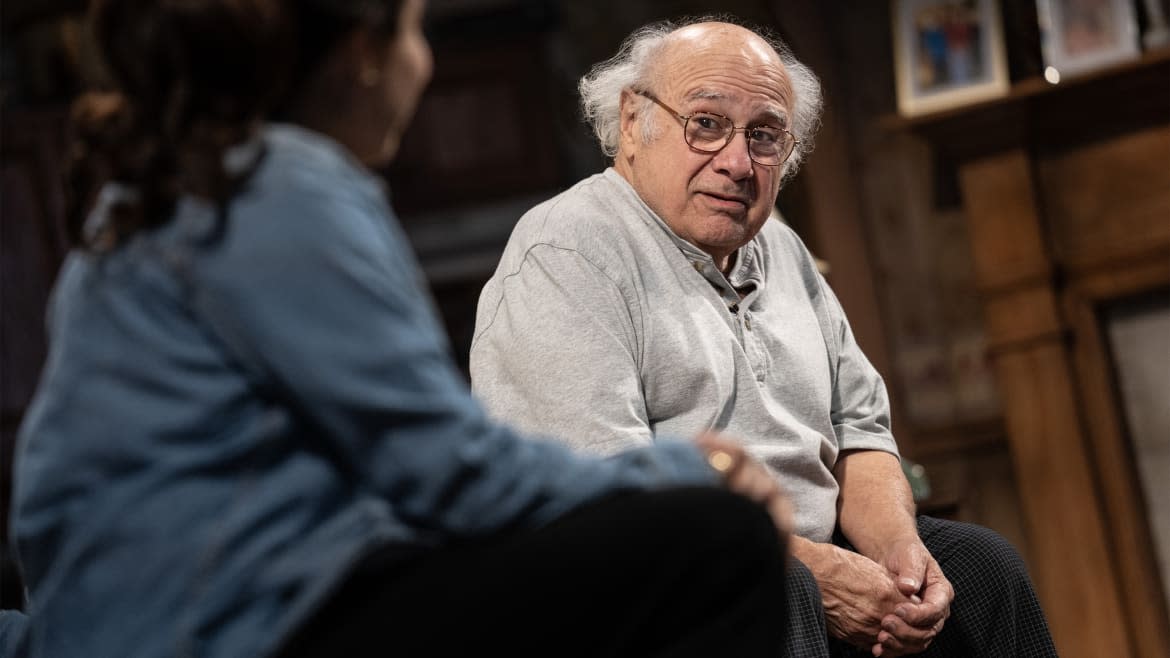Broadway Review: Danny DeVito Gets Lost in the Clutter of ‘I Need That’

- Oops!Something went wrong.Please try again later.
- Oops!Something went wrong.Please try again later.
- Oops!Something went wrong.Please try again later.
- Oops!Something went wrong.Please try again later.
- Oops!Something went wrong.Please try again later.
I Need That
Danny DeVito on Broadway: some welcome razzle-dazzle for the New York fall and winter, perhaps? Bluntly, sadly, no. In Theresa Rebeck’s play, I Need That (Roundabout Theatre Company/American Airlines Theatre, to Dec. 30), DeVito plays Sam, a widower who lives surrounded by clutter—his living room more a submarine of tottering piles of objects. Furniture is hidden, blanketed, and camouflaged under bric-a-brac.
The play, directed by Moritz von Stuelpnagel, asks what will it take for Sam to reform his ways, and clean up—especially with the threat of having his home taken away from him. Can his friend Foster (Ray Anthony Thomas) and daughter Amelia (Lucy DeVito, DeVito’s own daughter) help shift Sam out of his hoarding-like road to nowhere?
To match the living circumstances of its lead character, the play feels a deflating mess, with puzzling performances and staging as if no one involved quite knows what it is—comedy, whimsy, or low-key tragedy? Of course, a play can be all those things, but I Need That jerks uneasily around many registers, never finding its heart, or dramatic or thematic purpose. The play is as muddled as Sam’s home, with characters not really speaking to each other. It grouches along, just as Sam and Foster mull the world around them, but—thanks to so many similar stories and characters on TV and film—we know where this is headed.
Danny DeVito Had a Hell of a Time Playing the Devil
Sam unearths a TV set from the 1960’s, claims “one man’s trash is another man’s treasure.” Amelia says a capitalist world means we are all “drowning in junk.” The problem is the state of the grass outside, and a vexatious neighbor who took pictures of Sam’s home to send to the authorities.
But the problem is really Sam. An insensitively told story about a Black colleague in the Army is rightly admonished by Foster, who the plot then grafts on a completely implausible twist. The character of Amelia gets the same treatment in the last stretch of the play. Presumably, the intention of these silly plot-360s is to make Sam look better than his two moderating influences—or at least less annoying.
The play doesn’t propose anything truly original—Sam is configured as just another old guy, defying progress and the modern world. It doesn’t do anything surprising with his daughter, who loves her dad and wants him to move on. It doesn’t do anything surprising with Foster, his best friend. It merely lazily echoes every one of your expectations about how this trio would behave.
This isn’t to say that DeVito fails to connect with the audience. The funereal quiet of the theater during the play’s more lugubrious sequences is (thank goodness) broken by some wild flights of comic fancy which DeVito of course masters and revels in—such as playing against himself in a frenzied game of Sorry. But such moments are a bit like watching a flame burn bright, then be quickly doused by water; too soon Sam returns to his morose, kvetching self—trading grizzling with Foster, and barbs with his frustrated daughter.

(l to r): Ray Anthony Thomas (Foster), Danny DeVito (Sam), and Lucy DeVito (Amelia) in Roundabout Theatre Company’s world-premiere production of 'I Need That.'
There are some sharp lines. When Sam describes the challenge of deciding what to keep and what to chuck, Amelia admonishes him: “This is not Sophie’s Choice, this is Carrie, the end of Carrie. Where the house is so full of terrible things it just sucks itself into the earth. And poor psycho Carrie and her evil mother are buried, just completely buried. Under the wreckage. Of their lives. That’s what this is. And that is what is going to happen to you.”
Grief is at the root of Sam’s problems. He misses his wife (who relied on Post-Its near the end of her life to remind her of the basic coordinates of life). His world ended when she died, and so he turned his home into an island of familiars to hold close the memories of their life together—especially because she lost her memory. “The stupid thing is, I can’t really remember her now. The way she was before. All I remember are the Post-Its. And the knife. It’s happening to me. What happened to her. She disappeared.”
“I don’t want to disappear,” Sam says of the reason he keeps everything in cluttered heaps. “These things, the things you can touch. They keep the world from disappearing. And then you don’t disappear.”
As here, some of the writing is beautiful and sharp, but the play around the sentiments is more wonkily constructed. For a play in which every physical surface is hidden, we only ever see the surfaces of each character. DeVito is so magnetic a performer (he can charm and fire up the audience with a glance), one wonders if an Alan Bennett-ish Talking Heads-style monolog would not be the better format, so Sam could simply sketch the portrait of a life with DeVito free to mine all the available comedic and dramatic ore for himself.
As it is, in the TV movie of the week scheme of things, the twinned uplifting endings of domestic tidiness and outdoor liberation will come as no surprise. The standing ovations are similarly to be expected, but DeVito deserves a better Broadway canvas.
Poor Yella Rednecks
Qui Nguyen’s brilliant play-meets-musical—a must-see, book-right-now off-Broadway gem (Manhattan Theatre Club/NY City Center, to Nov. 26)—focuses on the continuing adventures of his Vietnamese parents, Tong (Maureen Sebastian) and Quang (Ben Levin). Where Nguyen’s first play, Vietgone, sketched their time meeting and beginning a life in America in 1975, Poor Yella Rednecks is set five years later in Arkansas, and their marriage now falling apart as new challenges and complications beset them. Their son, Little Man (Jon Norman Schneider, operating a puppet), is facing racist bullies. His grandma (Samantha Quan) will not speak English to him. Spoken rap breaks out periodically, and Little Man deals with his bullies, thanks to grandma’s ruthless coaching, with comic book action hero precision.

(l to r): Paco Tolson, Jon Hoche, Samantha Quan, Ben Levin, and Jon Norman Schneider in 'Poor Yella Rednecks.'
Poor Yella Rednecks is funny and moving, dramatic and profound, irreverent and thoughtful, and then back to being very funny again—and it has one of the most engagingly designed sets (centered around the giant letters Y-E-L-L-A) and lighting in New York theater right now by Tim Mackabee and Lap Chi Chu. May Andrales brings just the right kind of anarchic verve to directing what such a multi-toned piece of theater deserves.
Sabbath’s Theater
Only dedicated Philip Roth fans, who once read and embraced the much-ballyhooed central character, need to bother with the airless oddity that is Sabbath’s Theater (New Group/Signature Theater to Dec. 17). John Turturro—who adapted Roth’s 1995 novel with Ariel Levy—impressively navigates his way through the thicket of the protagonist Mickey Sabbath's profanities and ravenously embraced sexual transgressions. But what might seem shocking on the page, or “fearlessly filthy, funny, and moving” as the play’s blurb has it, shrinks and wilts on the stage.

John Turturro in “Sabbath’s.”
Turturro (ably aided by Elizabeth Marvel and Jason Kravits) brings an impressive level of bug-eyed mania to evoking Roth's potty-mouthed invective, but rather like people banging on about their best ever drug trips, all Sabbath’s boasting and foaming-at-the-mouth about sex, sex, and more sex (and eventually stripping right down so we see his own genitals) becomes a little exhausting. And not, as intended, in a good way.
Get the Daily Beast's biggest scoops and scandals delivered right to your inbox. Sign up now.
Stay informed and gain unlimited access to the Daily Beast's unmatched reporting. Subscribe now.

